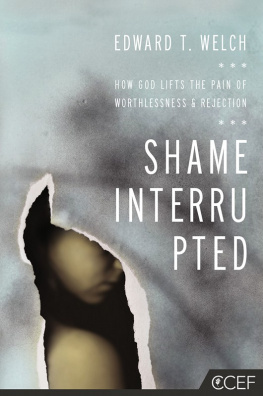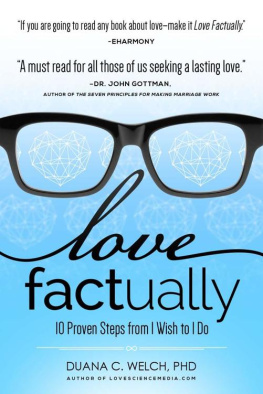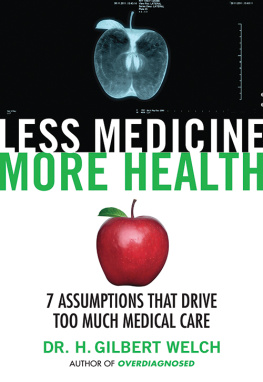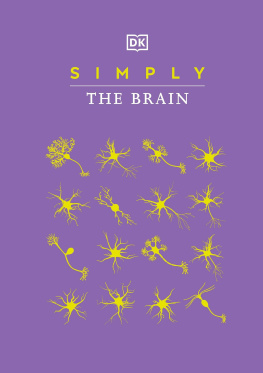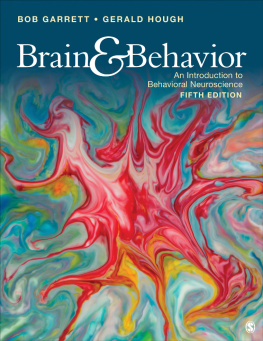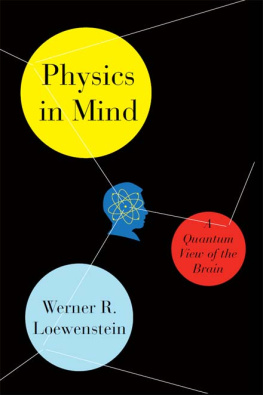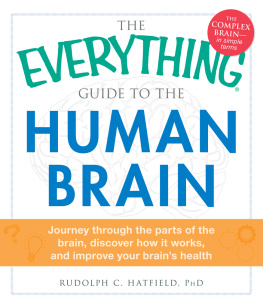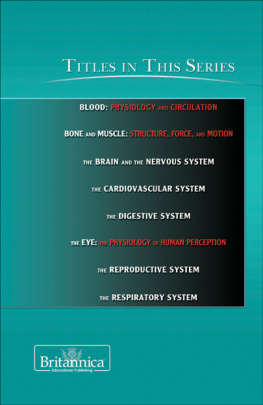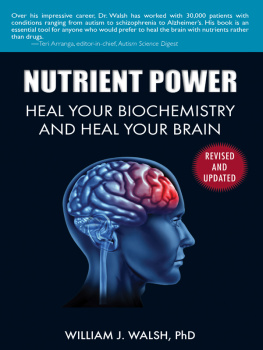Resources for Changing Lives
A series published in cooperation with
THE CHRISTIAN COUNSELING AND EDUCATIONAL FOUNDATION,
Glenside, Pennsylvania
Susan Lutz, Series Editor
Available in the series:
Edward T. Welch, When People Are Big and God Is Small: Overcoming Peer Pressure, Codependency, and the Fear of Man
Paul David Tripp, Age of Opportunity: A Biblical Guide to Parenting Teens
Edward T. Welch, Blame It on the Brain? Distinguishing Chemical Imbalances, Brain Disorders, and Disobedience
James C. Petty, Step by Step: Divine Guidance for Ordinary Christians
Paul David Tripp, War of Words: Getting to the Heart of Your Communication Struggles
Edward T. Welch, AddictionsA Banquet in the Grave: Finding Hope in the Power of the Gospel
Paul David Tripp, Instruments in the Redeemers Hands: People in Need of Change Helping People in Need of Change
David Powlison, Seeing with New Eyes: Counseling and the Human Condition through the Lens of Scripture
Blame
It on the
B3raiN2?
Distinguishing Chemical Imbalances,
Brain Disorders, and Disobedience
EDWARD T. WELCH
Blame It on the Brain? Distinguishing Chemical Imbalances, Brain Disorders, and Disobedience
Copyright 1998, 2011 by Edward T. Welch.
E-Book Published 2011 by New Growth Press, Greensboro, NC 27404.
All electronic rights reserved.
Previous published in print by P&R Publishing Company, Phillipsburg, NJ 08865.
ISBN 13: 978-1-936768-14-1
ISBN 10: 1-936768-14-3
All Scripture Quotations, unless otherwise indicated, are taken from the Holy Bible New International Version. NIV. Copyright 1973, 1978, 1984 by International Bible Society. Used by permission of Zondervan. All rights reserved.
To John Bettler,
the head and heart of the
Christian Counseling and Educational Foundation,
Glenside, Pennsylvania
CONTENTS
ACKNOWLEDGMENTS
MANY thanks to my colleagues at the Christian Counseling and Educational Foundation (CCEF), whose names could just as easily have appeared on the cover. John Bettler, David Powlison, and Paul Tripp continually shape my theological thought and academic direction. Not only they, but the entire CCEF staff and board made this possible through their support, prayer, and personal sharpening.
Susan Lutz, my coworker and editor, is the total package: wordsmith, a walking Strunk and White, cultural analyst, theologian, and counselor. Many thanks again.
My students in Counseling and Physiology at Westminster Theological Seminary and Biblical Theological Seminary always have great ideas, case studies, insights, and questions. Thank you.
My wife, Sharon, is the one who keeps my theology practical. It is great to have a companion whose strengths cover my weaknesses and whose love covers my sins.
INTRODUCTION
THE 1990s were officially declared the decade of the brain, and for good reason.
- President Reagans Alzheimers disease brought to national attention a disabling brain disease that creates innumerable practical difficulties and untold pain for hundreds of thousands of families and friends.
- Researchers offered possible treatments for previously incurable brain diseases.
- New technologies provided unprecedented views of the brain.
- Philosophers and theologians rediscovered the mind-body debate.
Given these and hundreds of other events, it is probably more accurate to say that the 1990s were merely the debut of influential brain research. Much more is yet to come.
I have been an interested student of the brain ever since I did research in brain diseases and brain electrophysiology in the 1970s. Since then, I have found that a rudimentary understanding of brain functioning can be very useful when it comes to understanding and helping others. For example, a knowledge of brain functioning can help us answer questions about chemical imbalances and the appropriateness of psychiatric medicines. It can help us understand people whose ability to learn and think are different from our own. And it can also help us distinguish between physical and spiritual problems. In the material that follows, I hope to provide some of this helpful information.
Yet, even though I am enthusiastic about understanding brain function, I wonder if the brain has been receiving too much credit. Consider, for example, some other discoveries of the 1990s that have been more troubling.
- Ritalin became the prescription for children.
- Mood swings that were once seen as a result of a bad day at the office, an afternoon battle with the children, or disappointment in relationships, are now viewed as the result of chemical imbalances in the brain, treated with antidepressant medications or, for those who want more natural assistance, St. Johns Wort and other herbs.
- We have a growing sense that the brain is the real cause of behavior. What started as a suggestion that brain chemistry is the ultimate cause of alcohol abuse has expanded to the point where brain chemistry is considered the ultimate cause for literally every human problem.
Have you ever been surprised at how some people have accused their brain, making it responsible for some of their bad behavior? I once watched a televised press conference given by a prominent politician that made me actually feel sorry for the mans brain. It was declared guilty without any real evidence.
This anti-drug politician had been a Teflon man through his two terms of office. Although he had faced constant legal charges, none of them stuck. Embezzlement, selling political favors, drug use he was always accused but never found guilty. Now he had been caught in the act of buying and using illegal drugs. It was all on tape. How was he going to get out of it this time?
As he was moving toward the podium, a reporter called out, Why did you do it? Why did you lie to us all these years?
His response was immediate. I didnt do it, he said. My brain was messed up. It was my brain that did it. My disease did it! There wasnt a hint of remorse only indignation that someone would ask such a question.
I had to shake my head as I watched. Surely he could come up with a better answer than that! No real student of the brain would accept such an excuse. I thought, These reporters will be all over him in a minute with that response.
But to my surprise, no one was laughing. His answer actually seemed to satisfy everyone present. Maybe they were afraid that they would appear ignorant of some brain research that supported the politicians claims. Maybe they didnt want to attack someone as a villain who might turn out to be a victim. Whatever the case, the politician appeared to have silenced his critics. He was already moving to another topic.
If privately polled, most of those attending the press conference would probably have said that this man was simply trying to avoid blame. But they would have had to give him credit for at least one thing: he knew how to change with the times. A few decades ago, his best bet would have been to blame his upbringing. Now, following some of the cultural trends of the day, he blamed it on his brain. And no one dared challenge him.
This means that the task before us in this book is twofold: to introduce areas where the brain has received too little credit, and to highlight where the brain has received too much credit (or blame).
As human problems seem to get both deeper and more widespread, people are desperate for solutions and the quicker the better! How wonderful it would be, many think, if the right pill or genetic alteration could solve our problems! And such hope is encouraged by reports suggesting that we are on the verge of revolutionary brain treatments for problems that were once attributed to the soul.



